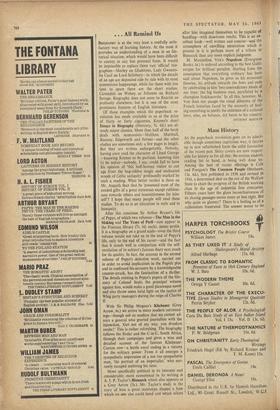... All Remind Us
BIOGRAPHY is at the very least a restfully satis- factory way of learning history. At the most it provides an understanding of a man in an his- torical situation, which would have been difficult to convey in any less personal form. It would be impossible to replace those vast 'official' bio- graphies—Morley on Gladstone, Lady Gwendo- lin Cecil on Lord Salisbury—in which the details of an age are deposited side by side with its most momentous happenings, while for those with less time to spare there are the short studies: Cavendish on Wolsey or Johnson on Richard Savage. Biography does not seem to flourish so profusely elsewhere, but it is one of the most prominent features of English literature.
Of those examples which the paperback re- volution has made available to us at the price of thirty or forty cigarettes, Keynes's short Essays in Biography (Mercury, 7s. 6d.) are al- ready minor classics. More than half of the book deals with economists—Malthus, Marshall, Ramsey, Edgeworth and Jevons—and the other studies are sometimes only a few pages in length.
But they are written unforgettably. Nobody, having once read the character of Lloyd George —knowing Keynes to be partisan, knowing him to be unfair—nobody, I say, could fail to have his opinion of 'this half-human visitor to our age from the hag-ridden magic and enchanted woods of Celtic antiquity' profoundly marked by such a reading. What better verdict is there on Mr. Asquith than that he 'possessed most of the needed gifts of a great statesman except ruthless- ness towards others and insensitiveness for him- self'? I hope that many people will read these studies. To do so is an education in style and in humanity.
After this concision Sir Arthur Bryant's life of Pepys, of which two volumes—The Man in the Making and The Years of Peril—now appear in the Fontana library (7s. 6d. each), seems prolix. It is a biography on a grand scale—even the third volume would not take us to the end of Pepys's life, only to the end of his career—and the fact that it stands well in comparison with the self-
revelation of its subject's famous diary says much
for its quality. In fact, the account in the second volume of Pepys's detective work, carried out in order to avoid implication in the Popish plot and to confound his accusers by a knowledgeable counter-attack, has the fascination of a thriller.
The details existing in Pepys's papers of the life- story of Colonel Scott, the principal witness against him, would make a good picaresque novel and also throw some lurid light on the tactics of Whig party managers during the reign of Charles II With Sir Philip Magnus's Kitchener (Grey Arrow, 6s.) we arrive in more modern surround- ings—though not so modern that we cannot ad- mire a general who greeted journalists with the injunction, 'Get out of my way, you drunken swabs!' This is rather refreshing. The biography follows the Sirdar and the C-in-C, South Africa. through their campaigns and gives a wise and detailed account of the famous Kitchener- Curzon row—a battle royal ending in a victory for the military power. From it all emerges a sympathetic impression of a not too sympathetic man, 'the portrait of an imperialist,' who nar- rowly escaped outliving his time.
More specifically political in its interests and considerably more economical in its writing is A. J. P. Taylor's Bismarck which also appears as a Grey Arrow (5s.). Mr. Taylor's study is the story of how a great statesman shaped a bow which no one else could bend and which others
after him imagined themselves to be capable of handling—with disastrous results. This is an ex- cellent book—well written and concise—and the atmosphere of unwilling admiration which is present in it is perhaps more of a tribute to Bismarck than any more explicit judgment.
M. Maximilien Vox's Napoleon (Evergreen Books, 6s.) is ordered according to the best Gallic recipes for brilliant paradox. Starting from the assumption that everything ordinary has been said about Napoleon, he gives us his economic theories, his attitude towards the Jews and ends by celebrating in him 'two contradictory ideals of our time: the big business man, paralleled by a champion Stakhanovite.' In all this, however, M. Vox does not escape the usual dilemma of the French historian faced by the necessity of find- ing something to justify the existence of a national hero, who, on balance, did harm to his country.
ANTHONY HARTLEY














































 Previous page
Previous page